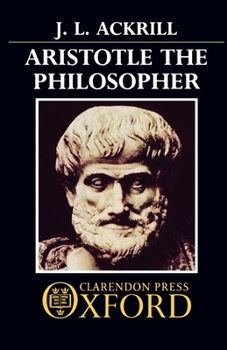Aristotle the Philosopher
Select Format
Select Condition 
Book Overview
Discusses Aristotle's views on change, natural science, the mind, logic, philosophical method, metaphysics, and ethics, and suggests why the Greek philosopher still provokes controversy.
Format:Paperback
Language:English
ISBN:0192891189
ISBN13:9780192891181
Release Date:September 1981
Publisher:OUP Oxford
Length:170 Pages
Weight:0.76 lbs.
Dimensions:0.4" x 5.1" x 7.7"
Customer Reviews
3 ratings
Aristotle by Ackrill
Published by Thriftbooks.com User , 18 years ago
This book is an excellent secondary read. I am reading original text from Aristotle and having this book in conjunction with the original text is very helpful. Ackrill is accurate with the the analysis of Aristotle's text. I would recommend this book for either undergraduate studies or someone who is interested in the classics.
Good, basic primer
Published by Thriftbooks.com User , 21 years ago
Introduction J. L. Ackrill undertakes to examine the highlights of Aristotle's thought and use them to springboard into philosophical inquiry. Ackrill begins the book with a brief biography of Aristotle and an introduction to his thought. Ackrill aims to clear up misconceptions concerning Aristotle's methodology and to see that criticisms that are raised against Aristotle should actually be leveled against his followers who had different interests, and less ability, than Aristotle (81). The major themes of Aristotle that are presented in this book are the analysis of change, formal logic, the mind-body problem, metaphysics, ethics, and philosophical logic. An Examination of Aristotelian Themes The Analysis of Change. Ackrill begins illustrating Aristotle's thought on matter and change by referring to Aristotle's response to the problem raised by Parmeninedes and his school, the Eleatics; namely, "What is, is one and unchangeable"-making predication and distinctions in thought and communication impossible. Aristotle deals with this as an absurdity based on deliberate misunderstanding. He makes two simple points: he attacks the Eleatics' central thesis by showing their equivocation of the verb "to be." Aristotle deals with this problem by stating that all logical communication assumes the qualifications of its terms. Secondly, he attacks their unwarranted dismal of ascribing characteristics or saying that things cannot change (25). Ackrill then outlines the three important aspects of Aristotle's analysis of change-"x comes to be by y," "y comes to be from x," and "y comes into being" (27, 28). Explanation of the Natural Sciences. In the previous chapter Ackrill used the analysis of change to show that in any changeable object matter and form can be distinguished. In the same way he shows that changes of life in nature depend upon its material make-up; namely, a thing in nature's behavior will be determined by what it is made of and how it is put together. This would seem to present a problem for Aristotle were it not for his asking the nature of the thing being changed (35). Ackrill then begins to examine Aristotle's inquiry into the nature of causation. Aristotle notes four types of causality for gaining knowledge, all of which may contribute to the "cause" of a thing. In doing so, Aristotle is seeking to ask the "why" of a thing, not just the "what." Ackrill first notes the material cause, that from which a constituent thing come to be. He then notes the formal cause; the form or mode is the cause. Ackrill locates the source of the change in the efficient cause. The end result of an action is its final cause (37). Logic. Ackrill's chapter on logic is the most difficult to comprehend in the book. One does not suggest that Ackrill's material his factually wrong, nor that he does not understand Aristotelian logic, but he does not go to great lengths to communicate the mat
An excellent introduction
Published by Thriftbooks.com User , 23 years ago
This book is an excellent introduction to Aristotle. It is so easy to make Aristotle confusing, but Ackrill writes very clearly, even on copmlicated and difficult matters. In only 155 pages he admirably achieves his aim in bringing to light the remarkable range and depth of Aristotle's thought. The book will be of use to beginners as a first introduction to Aristotle's philosophy as well as to those already acquainted with Aristotle. For those thirsty for more discussion about Aristotle, there are suggestions for further readings in the book. This might be the best short introduction to Aristotle around and I recommend it to anyone wanting to get to know Aristotle better.






